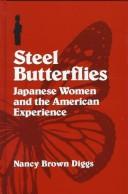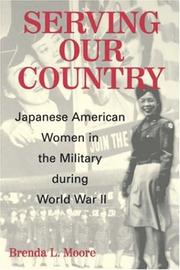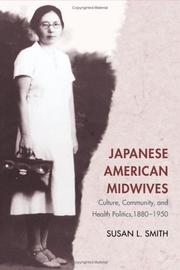| Listing 1 - 4 of 4 |
Sort by
|

ISBN: 0585062226 9780585062228 0791436233 0791436241 1438401175 9781438401171 Year: 1998 Publisher: Albany State University of New York Press
Abstract | Keywords | Export | Availability | Bookmark
 Loading...
Loading...Choose an application
- Reference Manager
- EndNote
- RefWorks (Direct export to RefWorks)
Steel Butterflies: Japanese Women and the American Experience examines the role of women in Japan as compared to the United States, approaching the subject from a new and thought-provoking angle. Not only does the reader learn how Japanese women view their own country from the vantage point of living in the United States, but their candid remarks also give Americans the opportunity to see themselves as others see them.
Japanese American women --- Women --- Sex role --- Women, Japanese American --- Social conditions.

ISBN: 0813571103 0813535220 9780813535227 9780813571102 0813532787 9780813532783 0813532779 9780813532776 0813532787 9780813532783 Year: 2003 Publisher: New Brunswick, NJ
Abstract | Keywords | Export | Availability | Bookmark
 Loading...
Loading...Choose an application
- Reference Manager
- EndNote
- RefWorks (Direct export to RefWorks)
Following the 1941 attack on Pearl Harbor and America's declaration of war on Japan, the U.S. War Department allowed up to five hundred second-generation, or "Nisei," Japanese American women to enlist in the Women's Army Corps and, in smaller numbers, in the Army Medical Corps. Through in-depth interviews with surviving Nisei women who served, Brenda L. Moore provides fascinating firsthand accounts of their experiences. Interested primarily in shedding light on the experiences of Nisei women during the war, the author argues for the relevance of these experiences to larger questions of American race relations and views on gender and their intersections, particularly in the country's highly charged wartime atmosphere. Uncovering a page in American history that has been obscured, Moore adds nuance to our understanding of the situation of Japanese Americans during the war.
Japanese American women soldiers --- Japanese-American women --- World War, 1939-1945 --- Women, Japanese American --- Women --- Women soldiers, Japanese American --- Women soldiers --- History. --- Participation, Japanese American. --- United States. --- WAC --- W.A.C. (Women's Army Corps) --- Women's Army Corps (U.S.) --- United States --- Ethnic relations. --- Japanese American women
Book
ISBN: 1607813459 9781607813453 1607813432 9781607813439 9781607813439 Year: 2014 Publisher: Salt Lake City, Utah
Abstract | Keywords | Export | Availability | Bookmark
 Loading...
Loading...Choose an application
- Reference Manager
- EndNote
- RefWorks (Direct export to RefWorks)
"What should by now be a familiar, if always disturbing event in American history--the internment of Japanese American citizens and aliens during World War II--is given an original treatment in this creative memoir. Lily Havey was ten years old when her family of four was uprooted and sent first to Santa Anita Assembly Center in southern California and subsequently for the duration of the war to the Amache (or Granada) internment camp in southeastern Colorado. She experienced removal and confinement as a pubescent young woman and with a distinctly individual perspective. She was an independent and, in her own and apparently her parents' view, difficult child. Her mother called her a gasa gasa girl, meaning wiggly, restless, unable to sit still. The interment put additional stress on the dysfunctional marriage of her parents and especially on her father, who had a particularly hard time coping. Lily Havey's recounting of that time is in turn wrenching, funny, touching, and biting but consistently informative and engrossing, especially with regard to the daily challenges of life and the internees' adaptations"--
BIOGRAPHY & AUTOBIOGRAPHY / Personal Memoirs. --- HISTORY / Military / World War II. --- HISTORY / United States / State & Local / West (AK, CA, CO, HI, ID, MT, NV, UT, WY). --- Japanese American women --- Japanese Americans --- World War, 1939-1945 --- European War, 1939-1945 --- Second World War, 1939-1945 --- World War 2, 1939-1945 --- World War II, 1939-1945 --- World War Two, 1939-1945 --- WW II (World War, 1939-1945) --- WWII (World War, 1939-1945) --- History, Modern --- Evacuation and relocation of Japanese Americans, 1942-1945 --- Internment of Japanese Americans, 1942-1945 --- Relocation of Japanese Americans, 1942-1945 --- Women, Japanese American --- Women --- Concentration camps --- Evacuation and relocation, 1942-1945. --- Evacuation of civilians --- Havey, Lily Yuriko Nakai, --- Nakai, Lily Yuriko, --- Nakai, Yuriko, --- Childhood and youth. --- Granada Relocation Center --- United States. --- Amache Relocation Camp --- Camp Amache --- Granada War Relocation Center --- History. --- Forced removal of Japanese Americans, 1942-1945 --- Evacuation and relocation, 1942-1945 --- Forced removal of civilians --- Forced removal and internment, 1942-1945.

ISBN: 1283609061 9786613921512 0252092430 9780252092435 9780252030055 0252030052 9780252072475 0252072472 025209123X 9780252091230 0252029615 9780252029615 0252077288 9780252077289 1283028905 9786613028907 9781283028905 6613028908 Year: 2005 Publisher: Urbana
Abstract | Keywords | Export | Availability | Bookmark
 Loading...
Loading...Choose an application
- Reference Manager
- EndNote
- RefWorks (Direct export to RefWorks)
Setting the history of Japanese American midwives in context, this book reveals little-known ethnic, racial, and regional aspects of women's history and the history of medicine. It demonstrates the impossibility of separating domestic policy from foreign policy, and public health from racial politics, medical care from women's care giving.
Race Relations --- Health Policy --- Asian Americans --- Midwifery --- Japanese --- Japanese American women --- Midwives --- Nursing specialties --- Birth attendants --- Nurse midwives --- Traditional birth attendants --- Medical personnel --- Women, Japanese American --- Women --- Midwife --- Traditional Birth Attendant --- Birth Attendant, Traditional --- Birth Attendants, Traditional --- Traditional Birth Attendants --- Asian Indian Americans --- Cambodian Americans --- Filipino Americans --- Hmong Americans --- Vietnamese Americans --- Chinese Americans --- Japanese Americans --- Korean Americans --- American, Cambodian --- American, Korean --- American, Vietnamese --- Americans, Asian --- Americans, Cambodian --- Americans, Chinese --- Americans, Filipino --- Americans, Hmong --- Americans, Japanese --- Americans, Korean --- Americans, Vietnamese --- Asian American --- Asian Indian American --- Cambodian American --- Chinese American --- Filipino American --- Hmong American --- Indian American, Asian --- Japanese American --- Korean American --- Vietnamese American --- Healthcare Policy --- National Health Policy --- Health Policies --- Health Policy, National --- Healthcare Policies --- National Health Policies --- Policy, Health --- Policy, Healthcare --- Policy, National Health --- Policy Making --- Interracial Relations --- Racial Relations --- Interracial Relation --- Relation, Interracial --- Relations, Interracial --- Relations, Race --- Relations, Racial --- Psychology, Social --- history --- History. --- Japan --- Emigration and immigration --- Feminism --- Women and literature --- Feminism and literature --- American literature --- English literature --- Agrarians (Group of writers) --- Human females --- Wimmin --- Woman --- Womon --- Womyn --- Females --- Human beings --- Femininity --- Intellectual life. --- History --- Books and reading --- Women authors --- History and criticism. --- Asians --- Health Care Policies --- Care Policies, Health --- Health Care Policy --- Policies, Health --- Policies, Health Care --- Policies, Healthcare --- Policy, Health Care
| Listing 1 - 4 of 4 |
Sort by
|

 Search
Search Feedback
Feedback About UniCat
About UniCat  Help
Help News
News